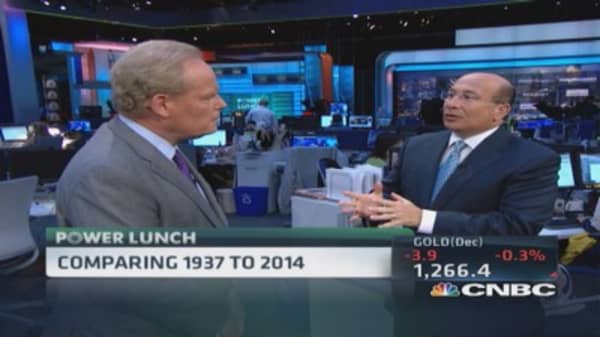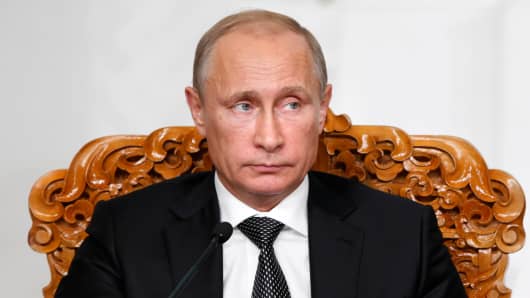While I am loathe to compare anyone to Hitler, Stalin, Mussolini, Mao, or even Pol Pot, for that matter, each gave fairly clearly signals of their imperial intentions, shrugged off by the West, with a great human and economic toll paid soon thereafter.
Of course, other "hot spots" are being reignited by ancient hatreds, tribal conflicts, religious messianism and territorial disputes that have an analogs in other periods of history.
But to an amateurish eye, Europe, at least, seems to be struggling with the type of national identity crises that gave rise to a second world war.
PR firm for Putin's Russia now walking a fine line
However, in some ways -- and possibly even more worrisome -- is the increasing resemblance the current global economic climate shares with the years leading up to the Great Depression, Part II.
Chastened by calamitous effects of the early Depression years, the U.S., and the rest of the world, took steps to reform the financial system, rein in excess government spending, and bring to a close the monetary accommodation that occurred in the aftermath of the 1929 stock market crash, and the deep dive into which the economy careened from 1929-1932.
Like today, in 1937, the U.S., and the rest of the world, were five years removed from the first leg of the Great Depression and beginning to find renewed confidence in the pace of global economic growth, or, in some cases, ignore instances in which economic activity left something to be desired.
Legislators and policy makers were sufficiently confident that the crisis had passed -- so much so, that interest rates and taxes were raised simultaneously, hurling the U.S., first and foremost, back into another massive contraction that took the rest of the world with it.
Read MorePimco: This is what's holding back the U.S. economy
The Federal Reserve, in 1937, essentially assigning the notion of "escape velocity" to the burgeoning economic recovery, hiked interest rates. Congress, contemporaneously, took to balancing the budget by raising taxes, a preoccupation that has been little changed across the vast expanse of time, even when, essentially, an unnecessary exercise.
The combination of tighter monetary and fiscal policies proved ruinous, both at home and abroad.
And while the Fed today is still only tapering, not tightening, the course of action appears to be at a critical inflection point. However, it's not really the U.S. I am most worried about. It's Europe, Japan, China, Brazil and, to a lesser extent on the economic front, Russia.
It appears that the rest of the world seems almost eager to repeat the policy errors of the past, both economic and geopolitical.
Japan has already countered the beneficial policies of its central bank, having adopted the first of two planned consumption tax hikes. The first increase, effective earlier this year, threw the Japanese economy into a tailspin.
Read MoreOp-ed: Two big problems in the job market
Though the Bank of Japan promises to ease policy more, a second consumption tax hike is slated for next year, another potential offset to the efforts of the Bank of Japan. The actual outcome could be worse than just an offset, again,prompting an abrupt reversal of fortune.
The European Central Bank, meanwhile, remains dangerously behind the curve in fighting DEFLATION, in stark contrast to the U.S., UK and Canada, where central banks are criticized for falling behind the inflationary curve.
That, to me, remains a dubious criticism as inflation, at least in the U.S., has failed to reach the Fed's 2-percent target for 27 consecutive months. A premature tightening in the U.S. would, indeed, be tantamount to a '37-style mistake, something both Janet Yellen, and her predecessor, Ben Bernanke, are, and were, acutely aware of.
I am increasingly worried that the ECB will not take the clear and necessary steps toward beating back deflation, as the Fed has successfully done. Europe also needs massive structural reforms and expansionary policies that would boost demand across the continent.
In China, the slowdown is accelerating, as an anti-corruption drive, uneven monetary policies and spot/start fiscal programs threaten to make uneven the steady pace of growth China has enjoyed for the past 20 years. That would not be good for the global economy.
From Moscow to Madrid, the geopolitical and economic issues are thorny, maybe the thorniest we have seen since the period prior to the onset of the calamities of the late 1930s and '40s.
Mark Twain famously noted that history doesn't repeat, but it rhymes. Let's hope the iambic pentameter to which the world is listening to now can be re-written before it becomes too repetitious for comfort.





